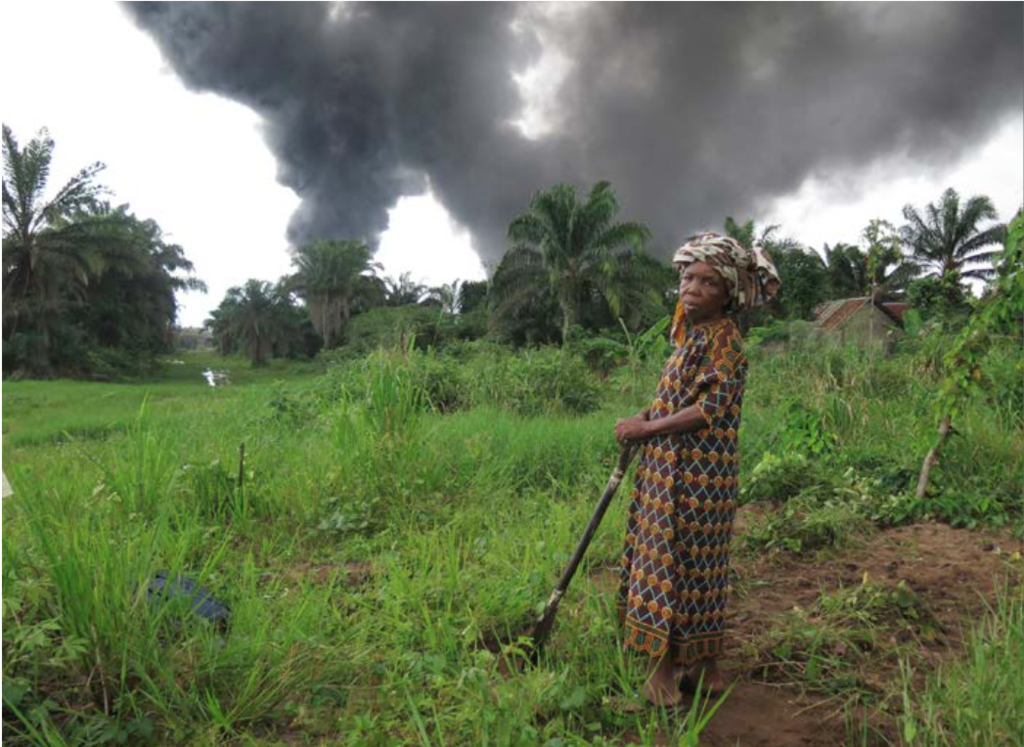
The oil giant Shell has been accused by Amnesty International of repeatedly failing to clean up the results of oil spills from its infrastructure in Nigeria.
Some of the spills where researchers for the charity found continued contamination dated back as much as 45 years, while others showed apparent oil pollution despite having been certified as clean by the Nigerian government within the last year.
Shell has reported around 200 spills a year in Nigeria for each of the last five years. The company blames attempts to steal oil from pipes as a large contributor to the high number of spills, but Amnesty International said ageing infrastructure is also a major factor.
Strict rules in the country require visible oil in water to be gone within 60 days of a spill, but photographs obtained by researchers from Amnesty International and the Centre for Human Rights and Development appear to show visible oil in multiple sites even years after spills.
The charity timed the launch of its new report to mark the 20th anniversary of the execution by the Nigerian government of nine Ogoni tribal leaders who had campaigned against oil extraction on their territory.
Relatives of those killed had accused Shell of "collusion" in the deaths. In 2009, Shell settled a civil claim from the families for $15.5 million, without admission of liability.

The oldest spill for which researchers found oil still present dated back to a 1970 fire and subsequent spill near Boobanabe, where researchers found "waterlogged areas with an oily sheen" and "soil was black and encrusted with oil".
This was despite, Amnesty said, the site having been declared cleaned-up in 1975 and again in 2012.
Researchers also found "soil soaked with crude oil" around the Bomu Manifold – where several Shell oil routes coincide – dating from a large fire in 2009, declared clean in 2012; further south in the Barabeedom swamp, which was declared clean by regulators a year ago; and in Ogale, which was declared clean in 2012.
Amnesty International said in its report researchers had then cross-checked the areas against Shell's database of leaks to make sure the contimation they reported could not have been caused by more recent spills.

"By inadequately cleaning up the pollution from its pipelines and wells, Shell is leaving thousands of women, men, and children exposed to contaminated land, water, and air, in some cases for years or even decades," said Amnesty International business and human rights researcher Mark Dummett.
"Oil spills have a devastating impact on the fields, forests, and fisheries that the people of the Niger Delta depend on for their food and livelihood. Anyone who visits these spill sites can see and smell for themselves how the pollution has spread across the land."
The research from Amnesty International and CEHRD followed up on a 2011 UN Environment Programme (UNEP) report examining the impact of oil spills on the Niger Delta, which also found sites declared clean were contaminated.
In its response to BuzzFeed News, Shell said it had acted on that report's recommendations, but struggled to verify Amnesty International's allegations.
"Without access to the full report it is difficult to verify and respond to the detailed claims made by this organisation," a spokesman for Shell Petroleum Development Company (SPDC JV) of Nigeria said.
"Implementation of the UNEP report is part of a wider programme of remediation, pipeline protection, community engagement, and social investment activities being undertaken by the SPDC JV with its government, community, and civil society partners in Ogoniland.
"These include grassroots campaigning on the health and environmental impacts of crude oil theft and illegal refining in all four local government areas of Ogoniland; implementation of alternative livelihoods programmes, including an agricultural entrepreneurialism scheme focused on Ogoni youth; and technical support to the Eleme water project, which is now administered by the Rivers State Government.
"SPDC JV is committed to cleaning up all spills from its facilities, irrespective of cause. This is equally the case in Ogoniland, despite the fact that it ceased producing oil and gas there in 1993.
"As the UNEP report stated, it is crucial to put an end to the widespread theft and illegal refining of crude oil, which continue to cause new spills and impact on the environment. Ensuring long-term sustainability remains a challenge that will require coordinated and collaborative action from all stakeholders."
